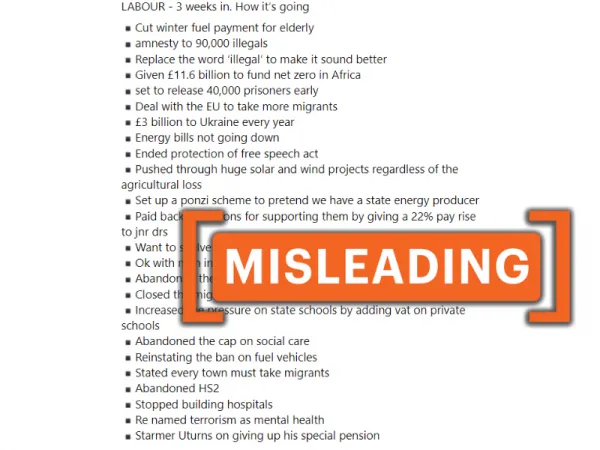By: Emilia Stankeviciute
August 12 2024
 Screenshot of the list, claiming that Labour is ending the Free Speech Act, releasing 40,000 prisoners, and redefining terrorism as a mental health issue. (Source: Facebook/Screenshot/Modified by Logically Facts)
Screenshot of the list, claiming that Labour is ending the Free Speech Act, releasing 40,000 prisoners, and redefining terrorism as a mental health issue. (Source: Facebook/Screenshot/Modified by Logically Facts)
Labour has paused the Free Speech Act for a review, announced early-release measures for around 5,500 prisoners, and has not redefined terrorism.
Context
Social media users have accused the Labour Party of introducing several controversial policies within its first three weeks in office.
These purported policies include the termination of the Free Speech Act, the proposed early release of 40,000 prisoners, and the reclassification of terrorism as a mental health issue.
A list (archived here) of Labour's alleged "wrongdoings" first emerged on X (formerly known as Twitter), where it garnered over 5,400 likes and nearly 3,000 shares. This claim quickly spread to Facebook, with one post (archived here) gaining significant traction, receiving 815 likes and 624 shares. Similar posts have also appeared on Threads. (archived here and here).
Screenshots of similar posts on Threads. (Source: Threads/Screenshot/Modified by Logically Facts)
Labour's action on prisons
Labour has announced measures to address prison overcrowding, including a temporary early-release scheme for certain low-level offenders. Justice Secretary Shabana Mahmood introduced this policy, which aims to alleviate prison overcrowding by allowing prisoners to be released up to 60 days early. The policy excludes serious violent offenders, sex offenders, and those convicted of terrorism.
"The government is changing the release point for eligible standard determinate sentenced prisoners from 50 percent to 40 percent, "Alex Hewson, interim head of policy and communications of the Prison Reform Trust, clarified to Logically Facts.
However, no evidence supports the claim that Labour plans to release 40,000 prisoners early. Instead, the estimated number of prisoners to be released early under this scheme is around 5,500. This measure is intended to be a temporary solution to the immediate overcrowding crisis.
Terrorism legislation not under consideration
While Labour has highlighted the economic costs of mental health problems and proposed significant investments in mental health care, there is also no indication it has equated terrorism with mental health issues.
According to the Terrorism Act 2000, terrorism is defined as the use or threat of action designed to influence the government or intimidate the public for a political, religious, racial, or ideological cause. This includes actions that involve serious violence against persons, serious damage to property, endangerment of lives, or severe risk to public health and safety.
To change this legal definition, Labour would need to amend the Terrorism Act 2000, which has not been stated in the King's Speech. Any such amendment would require a parliamentary vote.
Logically Facts contacted the Home Office to clarify its stance regarding terrorism but did not receive a response.
Labour's recent mental health policies focus on expanding mental health services, increasing support in schools, and addressing the economic impacts of mental health issues.
Academic discussions do recognize the mental health consequences of terrorism and the complex factors involved in radicalization. These discussions often explore the psychological impact of terrorism on victims, communities, and society at large, as well as the multifaceted pathways to radicalization, which may involve mental health issues, among other factors.
However, the academic considerations are separate from Labour's policies, which primarily aim to address mental health as a public health and economic issue without conflating it with terrorism.
Some changes to the Free Speech Act
Labour has not entirely canceled the implementation of the Free Speech Act but has put it on hold to conduct a review and consider its potential repeal. This decision came from Education Secretary Bridget Phillipson, who announced that the government would reassess the Higher Education (Freedom of Speech) Act 2023 due to concerns about its potential impact on universities and students' exposure to harmful and hate speech.
The Higher Education (Freedom of Speech) Act 2023 was initially designed to protect free speech in universities by imposing obligations on higher education providers and student unions. These entities were to ensure that free speech standards were upheld, protecting the rights of students and academics to express their views without fear of repercussions. It's important to note that this legislation was passed under the previous Conservative government.
Phillipson's announcement highlighted concerns that the Act might burden universities while potentially providing a platform for extremist views under the guise of free speech. The government will consider whether the Act should be amended or repealed entirely, but it has not been dropped completely at this stage.
Logically Facts contacted the Attorney General's Office for clarification on Labour's Free Speech Act policies but did not receive a response.
The verdict
The claims about the Free Speech Act, releasing 40,000 prisoners early, and renaming terrorism as a mental health issue are misleading. Labour has paused the Free Speech Act for review, announced temporary early-release measures to address prison overcrowding, and has not redefined terrorism. Thus, many of these assertions do not align with the documented actions and policies of the Labour government.